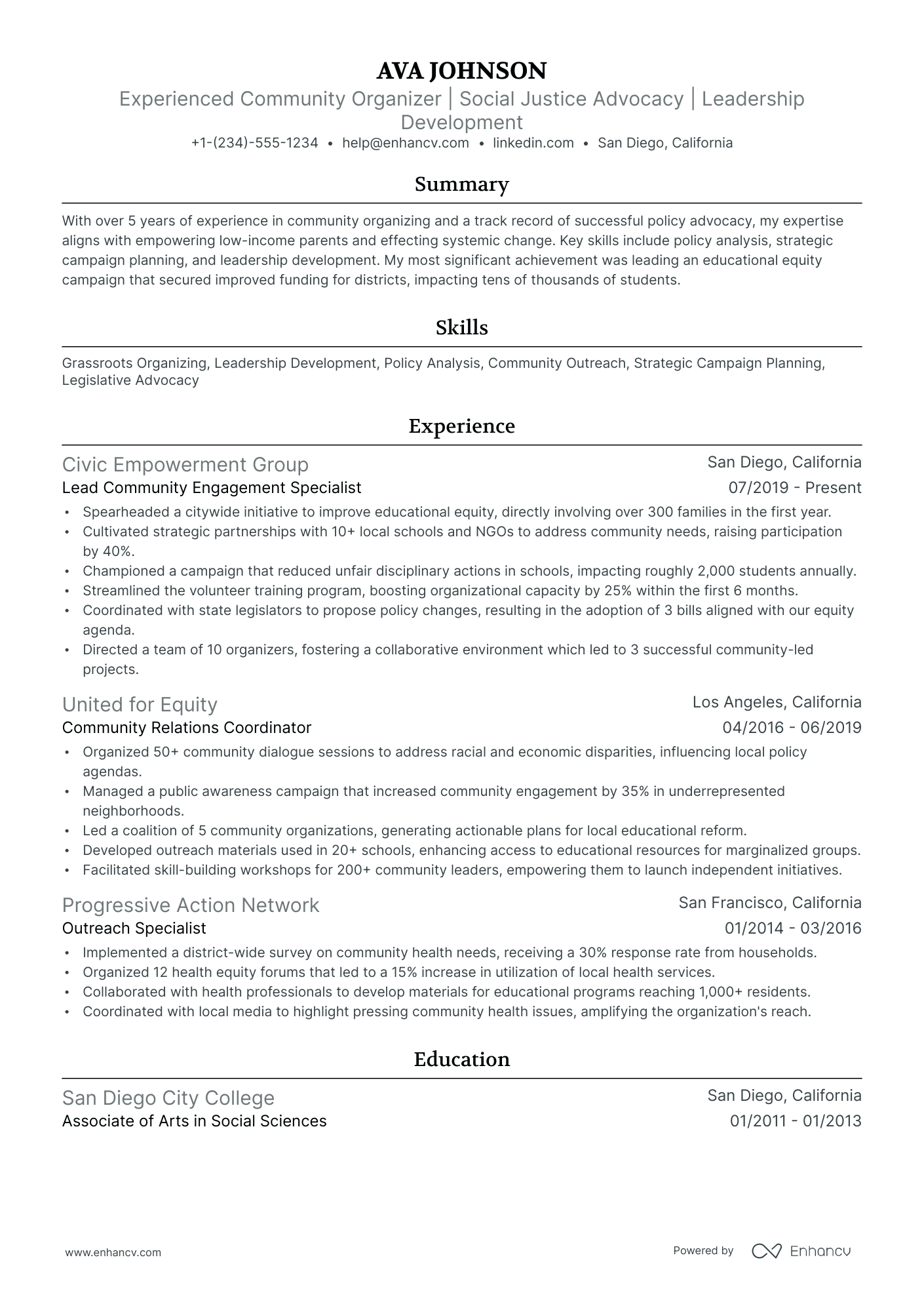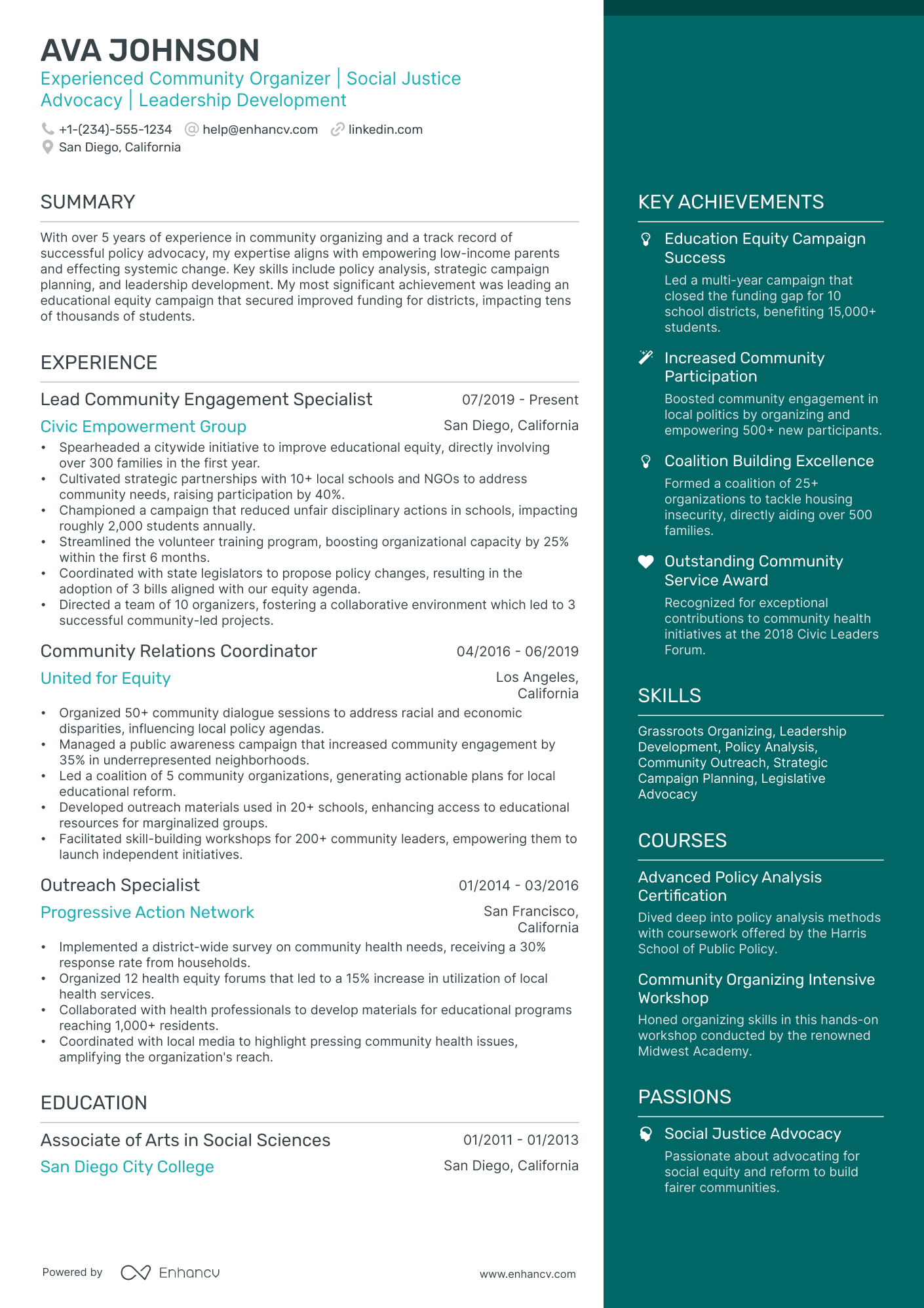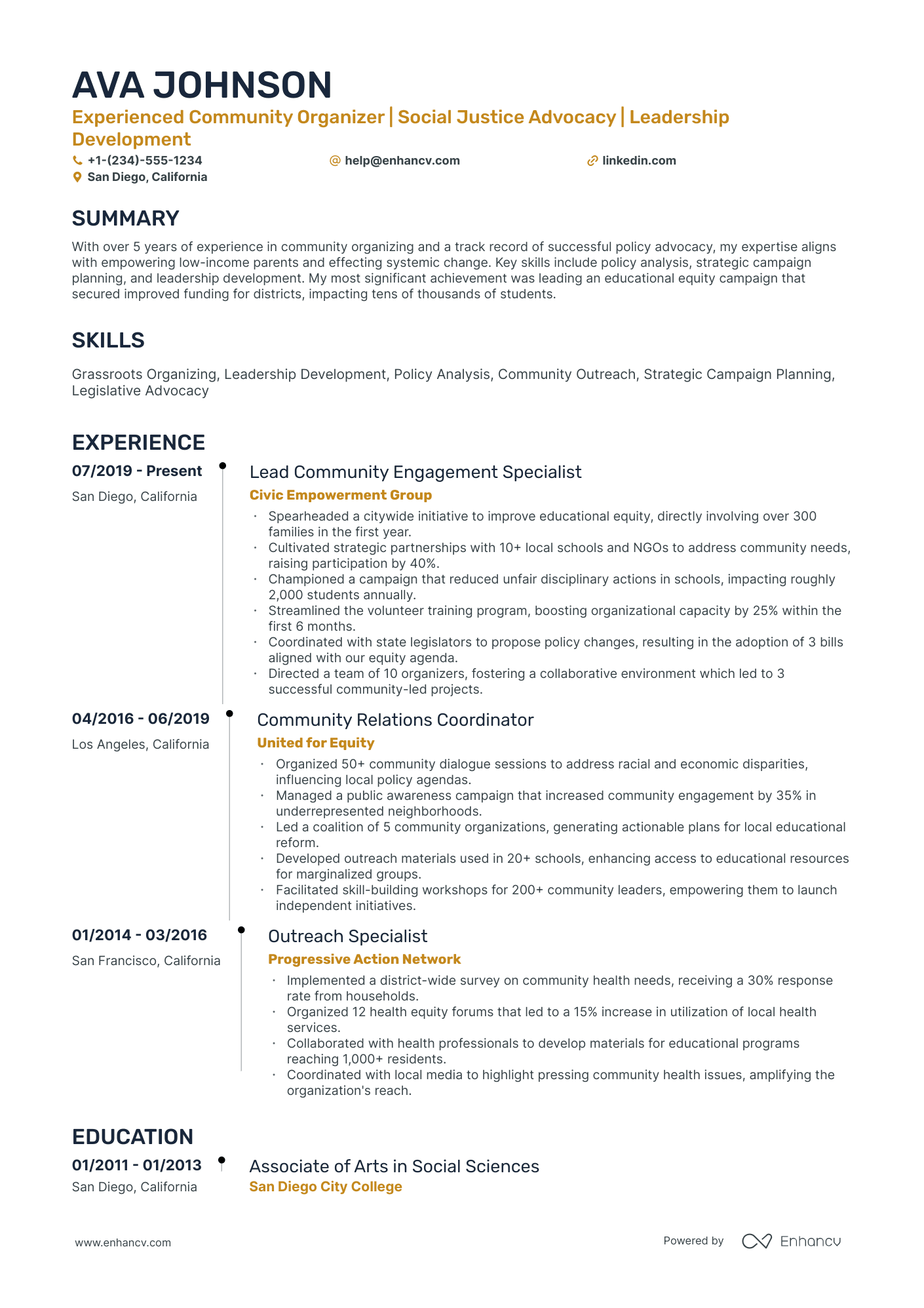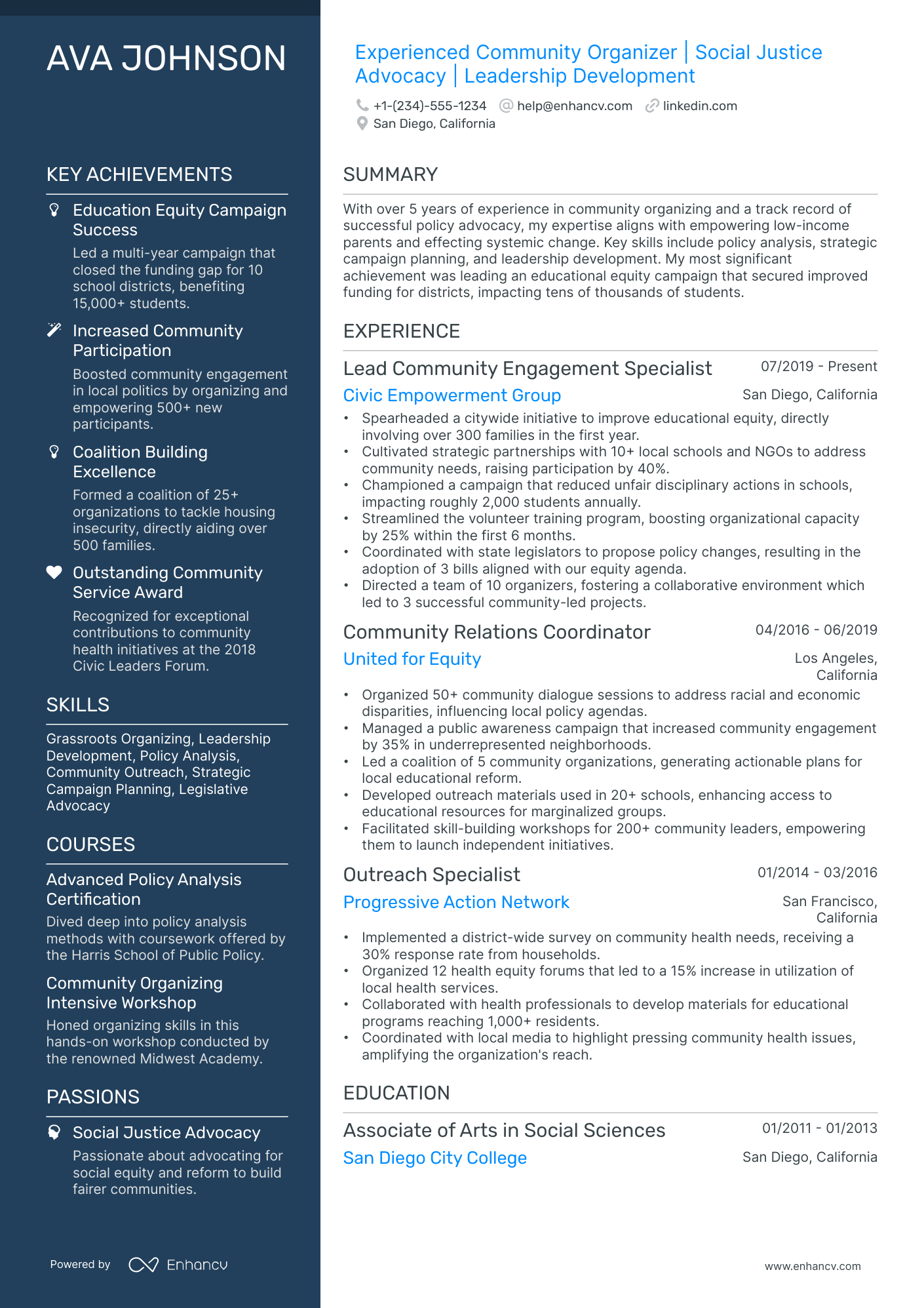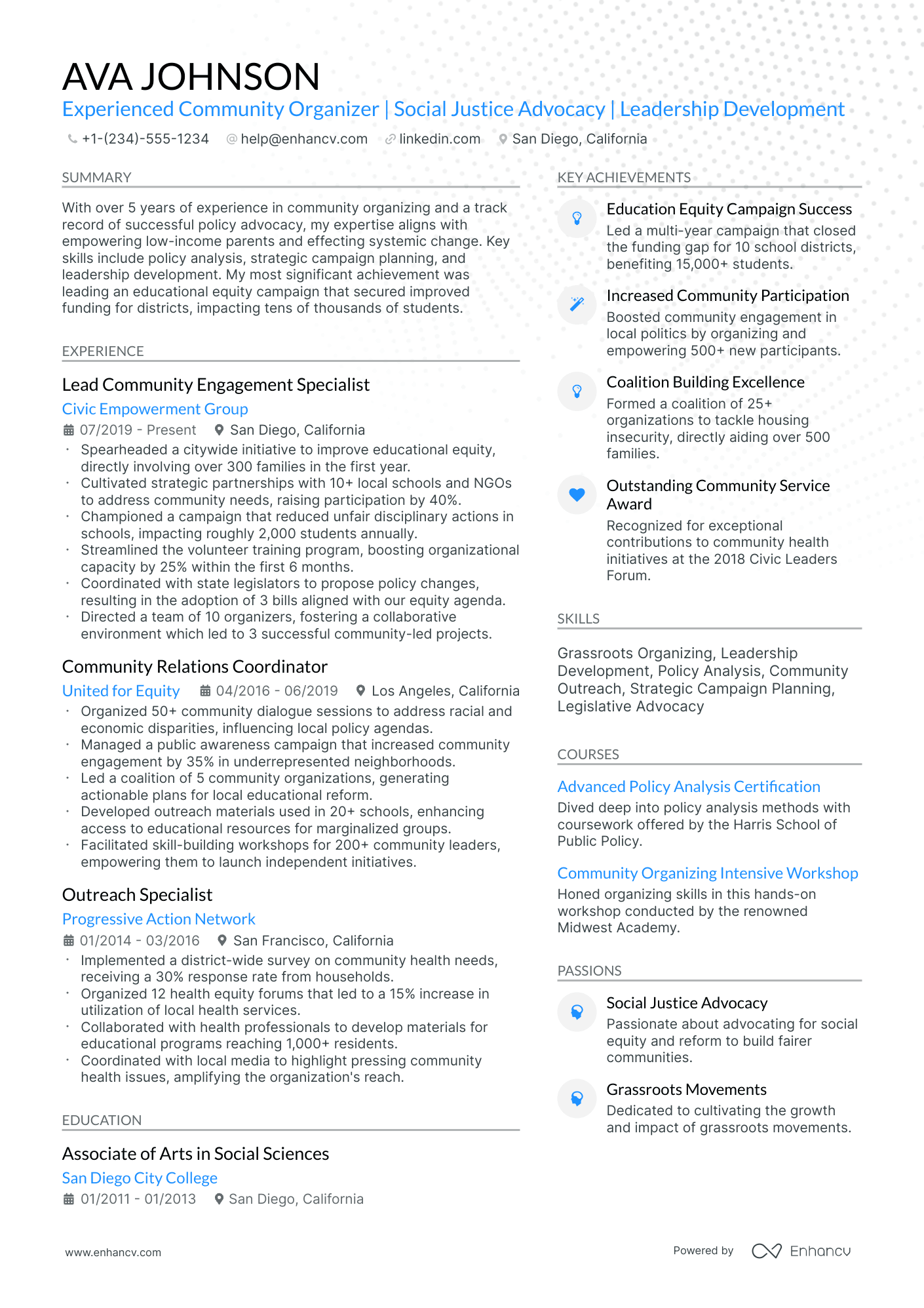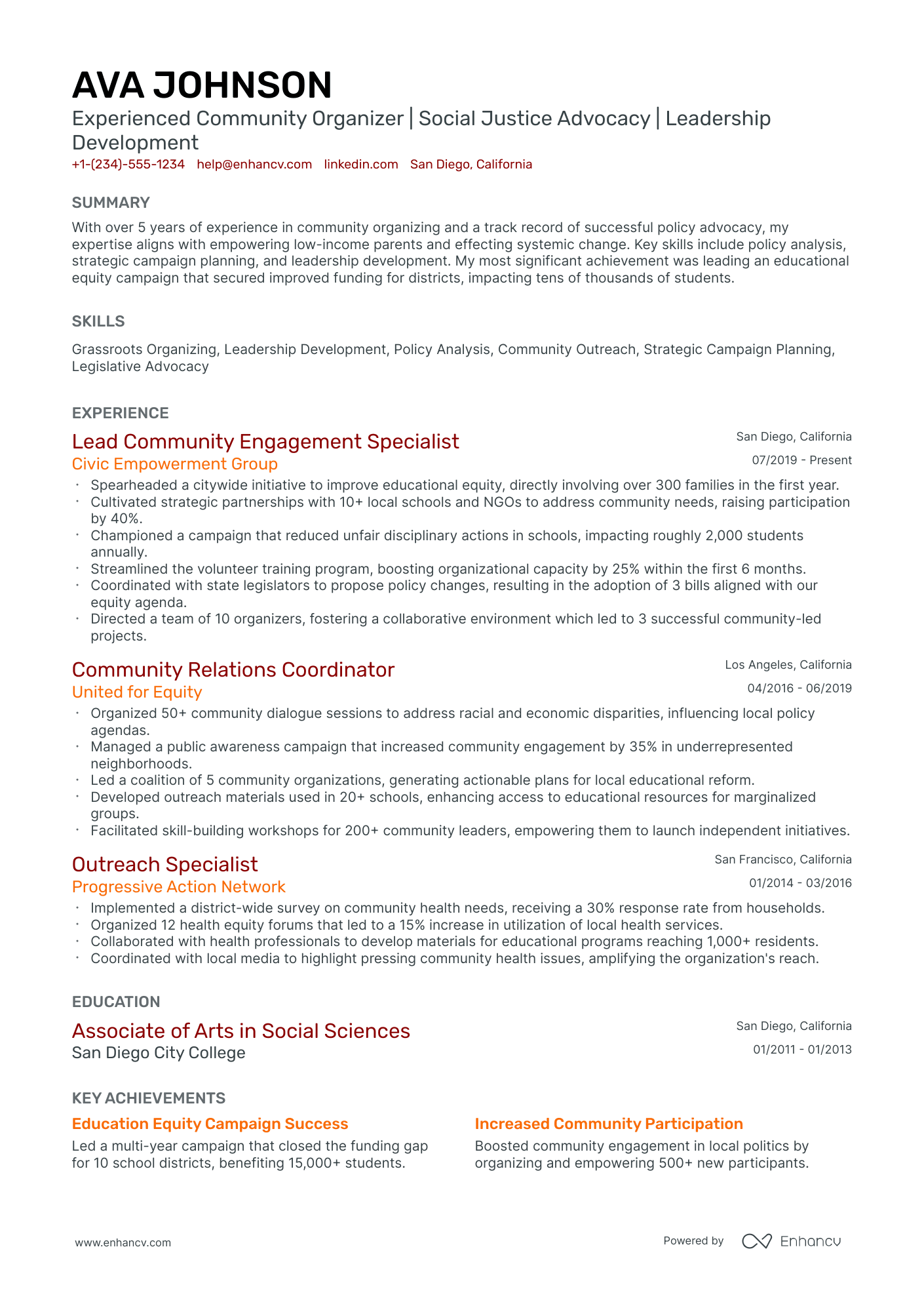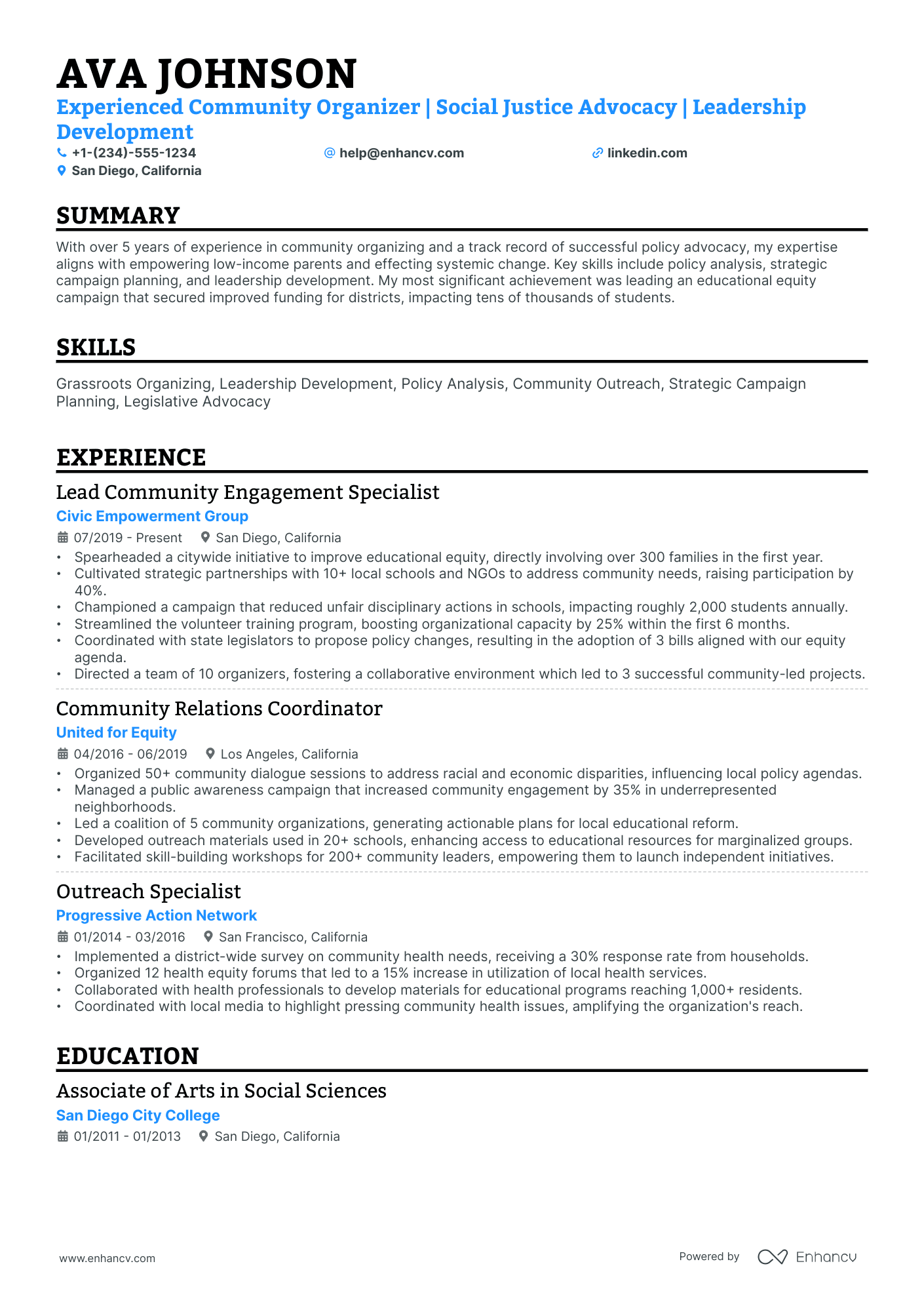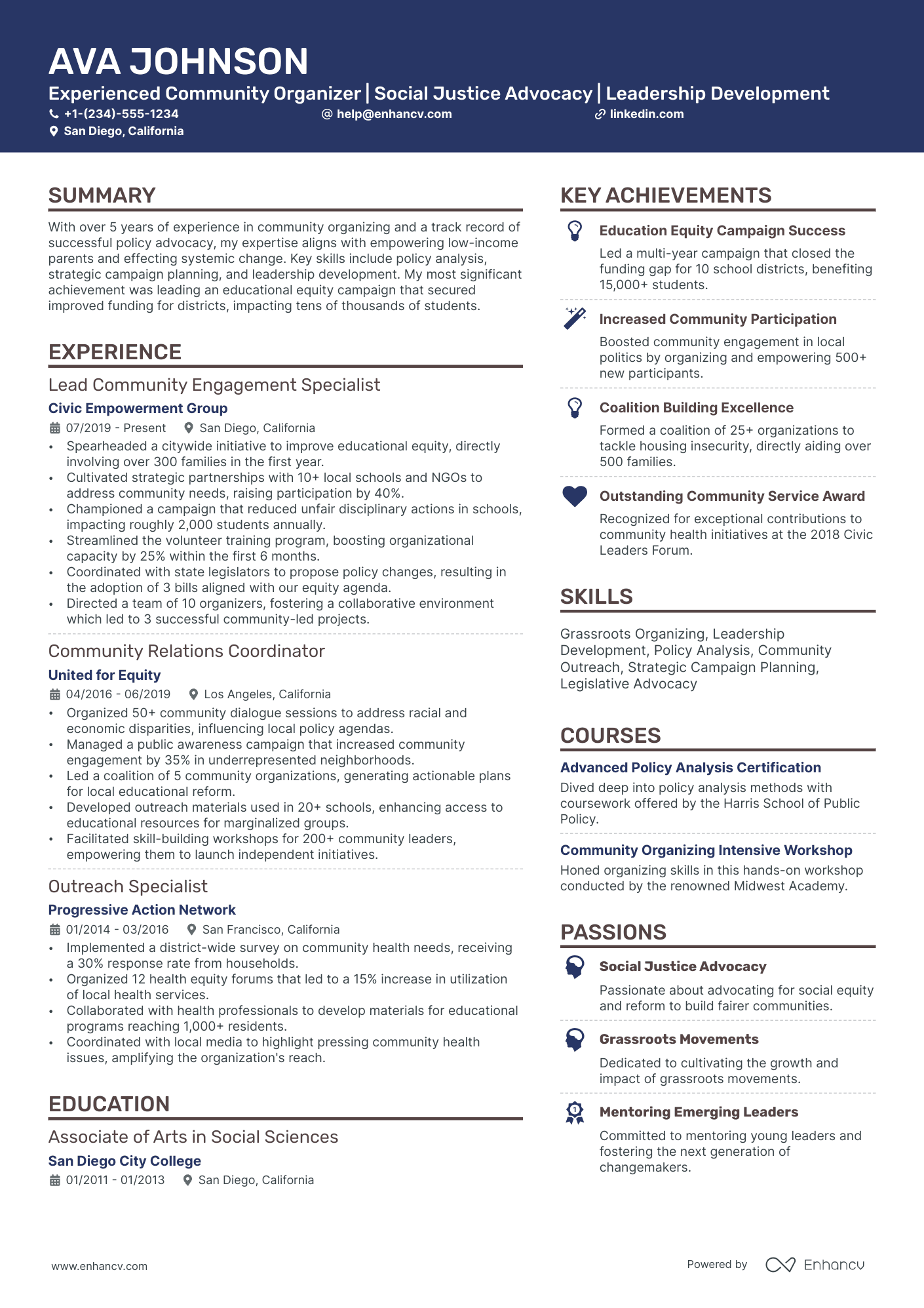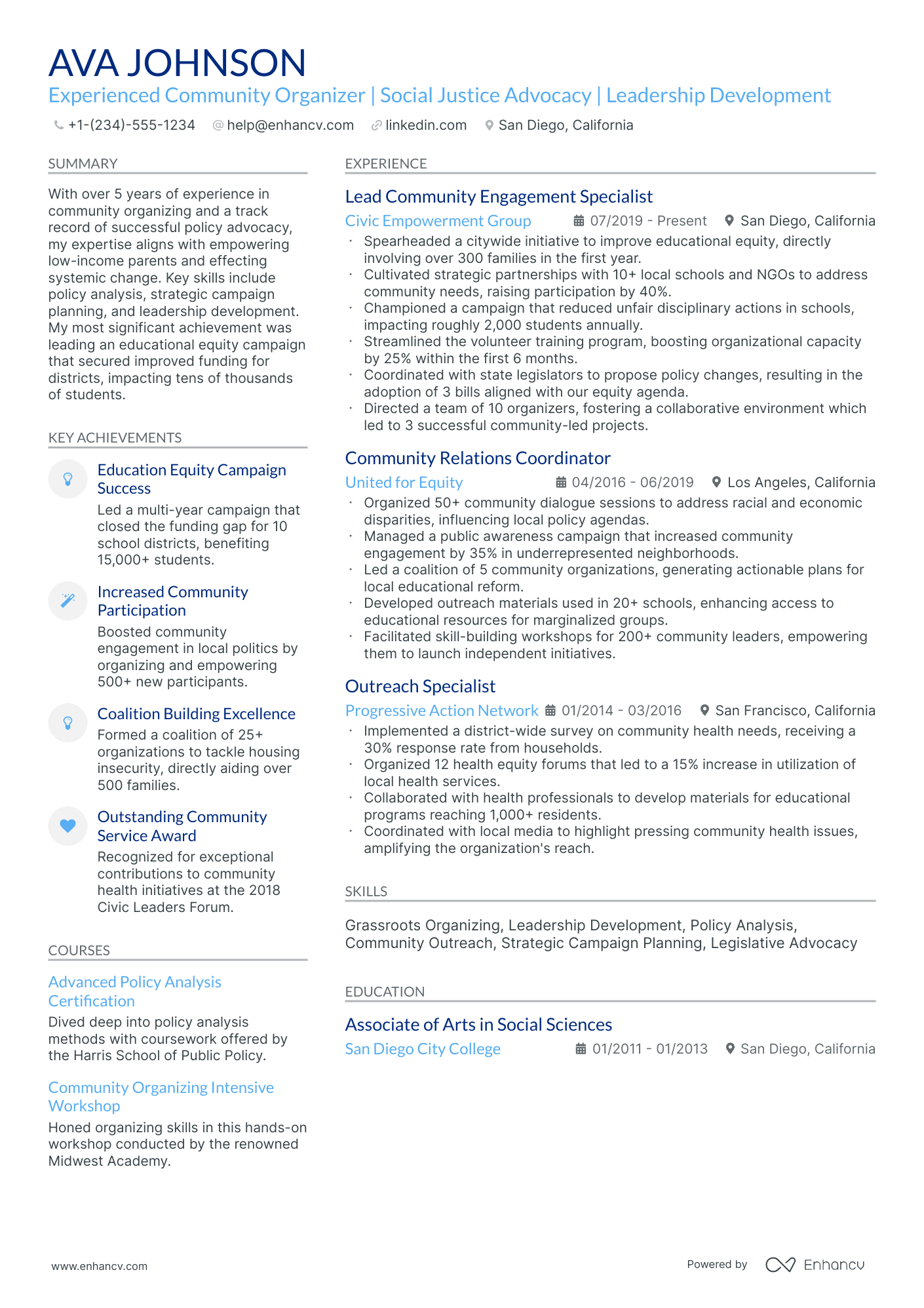As a community organizer, you might struggle with effectively highlighting the breadth and impact of your diverse grassroots campaigns on a resume. Our guide will provide you with targeted strategies to showcase your organizational accomplishments and quantify your community impact, ensuring your resume resonates with potential employers.
- Defining the highlights of your community organizer career through your resume summary, objective, and experience.
- Real-world community organizer resume samples with best practices on how to stand out amongst the endless pile of candidate resumes.
- Most in-demand community organizer resume skills and certifications across the industry.
- Standardizing your resume layout, while maintaining your creativity and individuality.
If the community organizer resume isn't the right one for you, take a look at other related guides we have:
The ultimate formula for your community organizer resume format
Our best advice on how to style your community organizer resume is this - first, take the time to study the job advert requirements.
The resume format you select should ultimately help you better align how your experience matches the specific role.
There are four crucial elements you need to thus take into consideration:
- How you present your experience. If you happen to have plenty of relevant expertise, select the reverse-chronological resume format to organize your experience by dates, starting with the latest.
- Don't go over the top with writing your resume. Instead, stick with a maximum of two-page format to feature what matters most about your profile.
- Headers aren't just for "decoration". The header of your resume helps recruiters allocate your contact details, portfolio, and so much more.
- The PDF format rules. It's the most common practice to submit your community organizer resume as a PDF so that your resume doesn't lose its layout. However, make sure the read the job well - in some instances, they might require a doc file.
Consider your target market – resumes in Canada, for example, follow different layout conventions.
Upload & Check Your Resume
Drop your resume here or choose a file. PDF & DOCX only. Max 2MB file size.
PRO TIP
Showcase any ongoing or recent educational efforts to stay updated in your field.
Essential sections that should make up your community organizer resume include:
- The header - with your contact details (e.g. email and telephone number), link to your portfolio, and headline
- The summary (or objective) - to spotlight the peaks of your professional career, so far
- The experience section - with up to six bullets per role to detail specific outcomes
- The skills list - to provide a healthy mix between your personal and professional talents
- The education and certification - showing your most relevant degrees and certificates to the community organizer role
What recruiters want to see on your resume:
- Demonstrated ability to mobilize and engage community members around common goals or issues.
- Experience with grassroots campaign strategies and community outreach techniques.
- Strong interpersonal and communication skills, highlighting successful coalition building and collaboration with diverse groups.
- Record of developing and implementing programs, workshops, or events that address community needs.
- Proficiency in data management tools and software to track engagement, organize volunteer databases, and report on progress.
Experts' advice on writing your community organizer resume experience
While the excitement and motivation for writing your community organizer resume was present in the first hour (or so), you now find yourself staring at the blank page.
The resume experience section is the one that allows you to make a memorable impression by matching job requirement with your past jobs and accomplishments.
To help you write this resume section, here are four mistakes you need to avoid:
- Listing every job you have had so far, including the irrelevant ones. Before that, consider each of your past roles based on relevancy to the role. It may be the case that the job you had 15 years ago may have taught you invaluable skills that are appropriate for the role;
- Including irrelevant work experience items. Those are past jobs that aren't linked with the role you're applying for (or so they seem). Consider how your past jobs will serve your professional presentation: will they be filling in a gap in your work history, or just taking up space?
- Focusing on responsibilities instead of accomplishments. Your community organizer resume shouldn't just be telling recruiters what you did in the past - as it's most often the case that candidates have had similar responsibilities. But, rather, the experience section should showcase the success you've attained in each past role, thanks to your unique skill set;
- Consider listing just your professional experience. Any role you've had in the past - e.g. volunteering, internships, etc. - can make it into your community organizer resume experience section. Make sure to include it alongside numbers and results.
Two more things you need to remember about your resume experience section.
The first are keywords. Or those specific job requirements that are crucial for the role . Ensure you've integrated them across your experience section to get sorted closer to the ideal candidate profile by the Applicant Tracker System (ATS).
The second are action verbs. Each of your experience bullets should start with a strong action verb, followed by your specific skill and your on the job achievements. Follow this formula to hint to recruiters what your unique value as a professional is.
Still with us? In the next section, we will show you how industry-leading professionals have avoided the four most common mistakes, while integrating keywords and action verbs in their experience section.
- Led a team of 15 volunteers in conducting door-to-door campaigns to increase community awareness about local environmental policies, reaching over 5,000 households.
- Coordinated with local businesses to sponsor community events, raising over $30,000 in funds to support neighborhood improvement projects.
- Implemented a data-driven approach to track outreach efforts, resulting in a 25% increase in community engagement for local town hall meetings.
- Developed a strategic plan for community-driven economic development which helped to revitalize a blighted neighborhood, attracting 3 new businesses and creating 50 local jobs.
- Managed cross-functional collaboration with city officials, resulting in the successful negotiation of public space usage for community events.
- Piloted a community leadership training program that equipped 20 local youth with skills in public speaking, project management, and civic engagement.
- Orchestrated an issue-based campaign that engaged over 10,000 residents, significantly influencing a change in local housing policy.
- Spearheaded a digital engagement initiative, utilizing social media to double the organization's online following and increase digital campaign effectiveness.
- Facilitated town hall meetings and workshops for an average of 200 attendees per event to address community concerns and gather feedback for city planning.
- Launched a voter registration drive in underrepresented neighborhoods that registered over 4,000 new voters for the local and national elections.
- Collaborated with technology teams to develop an app that mapped community resources, leading to increased access to health, education, and welfare services for residents.
- Managed the distribution of a community survey that gathered data from over 2,000 respondents, providing valuable insights for policy advocacy efforts.
- Pioneered a community gardening initiative that provided fresh produce to 300 local families and fostered community cohesion through shared responsibilities.
- Successfully advocated for the installation of new public park equipment, benefitting over 1,500 children in the community.
- Formed and maintained partnerships with local schools, increasing student participation in community service projects by 40%.
- Managed a team that successfully advocated for bike lanes in the city, resulting in 10 miles of new bike lanes and a 15% increase in biking traffic.
- Facilitated coalition building among diverse groups, including NGOs, faith-based organizations, and community leaders, to support affordable housing developments.
- Conducted policy research and analysis that informed organizational strategy on addressing local transportation inequities, directly impacting over 20,000 city residents.
- Directed a grassroots campaign that mobilized 500 volunteers for environmental awareness, leading to the passage of a local clean air ordinance.
- Cultivated community partnerships that expanded the reach of health and wellness programs to over 10,000 low-income individuals.
- Oversaw the creation and distribution of multilingual educational materials that increased the accessibility of citizen science projects in non-English speaking communities.
- Developed and executed a strategic plan for advancing LGBTQ+ rights in the community, which supported the opening of the city's first LGBTQ+ community center.
- Expanded volunteer base from 50 to over 200 active members through targeted recruitment campaigns and engagement efforts.
- Authored successful grant proposals totaling over $100,000, which funded new community programs focusing on inclusivity and diversity.
Quantifying impact on your resume
- Include the number of community projects you have led or been involved with to demonstrate your experience and reach.
- Measure the percentage increase in community engagement or participation that resulted from your initiatives to showcase your effectiveness.
- Quantify the amount of funds you raised for community projects to highlight your fundraising ability and resource management.
- List the number of volunteers you recruited and managed to show your leadership and networking skills.
- Specify any improvements in community metrics, such as reduced crime rates or increased graduation rates, to underline the tangible impact of your work.
- Mention the scale of events you have organized, including the number of attendees, to display your event management capabilities.
- Detail the number of partnerships or collaborations you established with local businesses or organizations to convey your strategic alliance-building.
- Enumerate any awards or recognitions received to reflect the external validation of your community work's impact.
Action verbs for your community organizer resume
No relevant experience - what to feature instead
Suppose you're new to the job market or considering a switch in industry or niche. In such cases, it's common to have limited standard professional experience. However, this isn't a cause for concern. You can still craft an impressive community organizer resume by emphasizing other sections, showing why you're a great fit for the role:
- Emphasize your educational background and extracurricular activities to demonstrate your industry knowledge;
- Replace the typical experience section with internships or temporary jobs where you've gained relevant skills and expertise;
- Highlight your unique skill set, encompassing both technological and personal abilities;
- Showcase transferable skills acquired throughout your life and work experiences so far.
Recommended reads:
PRO TIP
Showcase any ongoing or recent educational efforts to stay updated in your field.
Popular community organizer hard skills and soft skills for your resume
Apart from assessing your professional expertise, recruiters are on the lookout for whether your skills align with the job.
Your profile would thus be assessed in regard to your:
- Hard or technical skills - your ability to perform on the job using particular technologies or software
- Soft skills - how you adapt, communicate, and thrive in different environments.
Both types of skills - hard and soft skills - are important for your resume, so make sure to create a dedicated skills section that:
- Lists up to five or six skills that align with the job advert.
- Integrates vital keywords for the industry, but also reflects on your personal strengths.
- Builds up further your skills with an achievements section within which you explain what you've achieved thanks to using the particular skill.
- Aims to always quantify in some way how you've used the skill, as it's not enough to just list it.
What are the most sought out hard and soft skills for community organizer roles?
Check out the industry's top choices with our two dedicated lists below:
Top skills for your community organizer resume:
Event Planning Software
Social Media Management Tools
Data Analysis Software
Mapping and GIS Tools
Survey and Polling Tools
CRM Software
Email Marketing Platforms
Project Management Software
Budgeting Tools
Content Creation Tools
Communication Skills
Leadership
Empathy
Negotiation
Problem-Solving
Teamwork
Adaptability
Public Speaking
Conflict Resolution
Cultural Competence
PRO TIP
Showcase any ongoing or recent educational efforts to stay updated in your field.
Discover the perfect certification and education to list on your community organizer resume
Value the insights your resume education section offers. It can shed light on various proficiencies and experiences tailored for the job.
- Add only college or university degrees, stating the institution and duration.
- If you're nearing the end of your degree, note your graduation date.
- Weigh the pros and cons of including unrelated degrees - it might not be your best choice with so little space on your resume.
- Talk about your educational achievements if they amplify your relevant experience.
There are so many certificates you can list on your resume.
Just which ones should make the cut?
- List your prominent higher education degree in a separate box, alongside the name of the institute you've obtained it from and your graduation dates
- Curate only relevant certificates that support your expertise, hard skills, and soft skills
- Certificates that are more niche (and rare) within the industry could be listed closer to the top. Also, this space could be dedicated to more recent certifications you've attained
- Add a description to your certificates or education, only if you deem this could further enhance your chances of showcasing your unique skill set
When listing your certificates, remember that it isn't a case of "the more, the merrier", but rather "the more applicable they are to the industry, the better".
Recruiters have hinted that these are some of the most in-demand certificates for community organizer roles across the industry:
The top 5 certifications for your community organizer resume:
- Certified Community Engagement Professional (CCEP) - International Association for Public Participation (IAP2)
- Certified Nonprofit Professional (CNP) - Nonprofit Leadership Alliance
- Certificate in Community Organizing and Social Action (COSA) - Local or regional training institutes
- Certificate in Social Justice and Community Organizing (CSJCO) - Schools or organizations specializing in social justice
- Civic Engagement Certificate (CEC) - Association for Research on Nonprofit Organizations and Voluntary Action (ARNOVA)
PRO TIP
The more time and effort you've put into obtaining the relevant certificate, the closer to the top it should be listed. This is especially important for more senior roles and if the company you're applying for is more forward-facing.
Recommended reads:
Deciding between a resume summary or objective for your community organizer role
Understanding the distinction between a resume summary and an objective is crucial for your community organizer resume.
A resume summary, typically three to five sentences long, offers a concise overview of your career. This is the place to showcase your most pertinent experience, key accomplishments, and skills. It's particularly well-suited for those with professional experience relevant to the job requirements.
In contrast, a resume objective focuses on how you can add value to potential employers. It addresses why they should hire you and outlines your career expectations and learning goals. Therefore, it's ideal for candidates with less experience.
In the following section of our guide, explore how resume summaries and objectives differ through some exemplary industry-specific examples.
Resume summaries for a community organizer job
- With over 10 years of seasoned outreach and advocacy experience within nonprofit sectors, this candidate boasts a proven track record of successful community program development and diverse volunteer management. Anchor of a groundbreaking inner-city youth initiative that reduced juvenile crime rates by 30% over five years through strategic partnership cultivation.
- Armed with a Ph.D. in Social Work, this professional channels over 8 years of direct community engagement and leadership within urban neighborhoods, driving change through policy development and implementation. Led a multi-organizational coalition that secured $5M in funding for community health programs.
- Career-long accountant transitioning to community organizing, carrying over a decade of experience in fostering client relationships and a passion for community engagement. Key player in spearheading volunteer tax assistance programs for non-profits, affording financial empowerment to underprivileged communities.
- Marketing executive pivoting to community organization with a strong background in campaign strategy and brand management, intent on leveraging 15 years’ experience to advance community projects. Renowned for a viral eco-conscious initiative which widened brand reach and generated significant volunteer participation rates.
- Eager to embark on a career in community organizing, harnessing an energetic commitment to social change and grassroots activism. Aims to leverage recent Sociology degree and internship with a city council member to build inclusive programs and effectively bridge the gap between policymakers and the community.
- Aspiring community organizer with a fervent dedication to environmental justice and profound regional familiarity, ready to leverage robust interpersonal capabilities and a B.A. in Environmental Studies for impactful local engagement, aiming to catalyze sustainable practices and policy advocacy at a grassroots level.
Optimize your resume summary and objective for ATS
Drop your resume here or choose a file.
PDF & DOCX only. Max 2MB file size.
Miscellaneous community organizer resume sections for a more personalized approach
Your community organizer resume can reflect even more upon your personality and best qualities - that is if you decide on including a couple of additional resume sections to support your application.
Some of the best-accepted industry-wide choices include the:
- Resume projects - getting into the outcomes of your most important work, so far;
- Languages on your resume - detailing your proficiency level;
- Special recognitions - dedicated to your most prominent industry awards;
- Hobbies and interests - defining how you spend your free time.
Key takeaways
- Your community organizer resume is formatted professionally and creates an easy-to-read (and -understand) experience for recruiters;
- You have included all pertinent sections (header, summary/objective, experience, skills, certifications) within your community organizer resume;
- Instead of just listing your responsibilities, you've qualified them with skills and the results of your actions;
- Within your community organizer resume, you've taken the time to align specific job requirements with your unique expertise, showcasing the value you can provide as a professional;
- Technologies and personal skills are featured across different sections of your community organizer resume to achieve the perfect balance.
